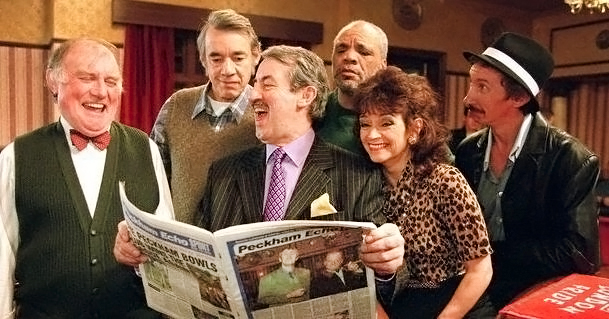There is a funny Stewart Lee sketch with the premise that a village has created an annual folk tradition based on the bit in Only Fools And Horses where Del Boy falls through the bar. Lee was inspired by an audience vote some years back which determined that the incident, from the 1989 episode “Yuppy Love”, was the series’ single funniest moment.
In the sketch and its preamble, Lee seems to be mocking the alleged vacuity of broad, slapstick-style sitcom humour. But there is a counterpoint to his comedy elitism, namely that a widely shared stock of well-known jokes, situations and characters is very valuable for our national life.
The death of John Challis, who played Boycie in Only Fools, was a poignant reminder that the age of such communal reference points may be passing away. It’s hard to think of a programme made in the last couple of decades that has achieved such huge popularity or has managed the kind of cultural osmosis whereby even people who don’t watch have a decent idea of what it’s about.
Mrs Brown’s Boys, an oft-quoted example of a popular sitcom that is widely loved by the general public despite the derision of critics and elites, has never broken the 10 million viewer mark except for two Christmas specials, and its audience has been in sharp decline in recent years.
Only Fools, by contrast, was regularly getting in excess of 15 million viewers per episode by the late 1980s, when the British population was around 10 million fewer than today. The Christmas specials aired in the early nineties, after the end of the normal run in 1991, achieved 20 million or more viewers, with the justly famous 1996 special “Time On Our Hands” pulling in over 24 million. The later ill-advised and disappointing specials easily passed 15 million viewers, with the first getting 21.35 million.
Even now, nearly two decades since the last episode aired, everyone knows who Del Boy and Rodney are, just like everyone has heard of Basil Fawlty and Captain Mainwaring and David Brent — although I suspect that even Brent may not have quite the same near-universal and multi-generational recognition as classic sitcom characters from earlier eras.
It’s not difficult to find plausible explanations for the decline of a shared TV culture. The internet, of course, is public enemy number one here, enabling as it has the unstoppable rise of streaming services and TV on demand. Along with the incredible multiplication of channels that has taken place since the turn of the century, it makes it almost impossible for a single broadcast show to be an enormous event in the way that “Time On Our Hands” was.
There are occasional exceptions. Line Of Duty’s finale in May this year broke 16 million viewers, and the current big drama Vigil is chugging along nicely at just under 10 million. But I strongly doubt that large numbers of people will still be able to name the characters from those shows in ten or twenty years’ time. Their scenarios and storylines will not become widely-known enough to be parodied or absorbed into a common cultural vocabulary. The same goes for comedy. I loved Detectorists, but it was never going to have the kind of wide appeal that you need to achieve breakout success.
Those kind of programmes just don’t seem to exist any more and that feels like a great loss; the end, or at least the beginning of the end, of anything akin to a genuine national culture. The fragmentation of our entertainment diets doesn’t just affect what we watch, but also changes, in a fundamental way, the things we talk and joke about, as well as the things we have in common.











Join the discussion
Join like minded readers that support our journalism by becoming a paid subscriber
To join the discussion in the comments, become a paid subscriber.
Join like minded readers that support our journalism, read unlimited articles and enjoy other subscriber-only benefits.
Subscribe